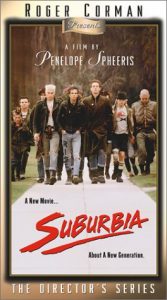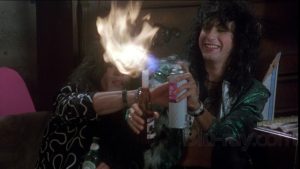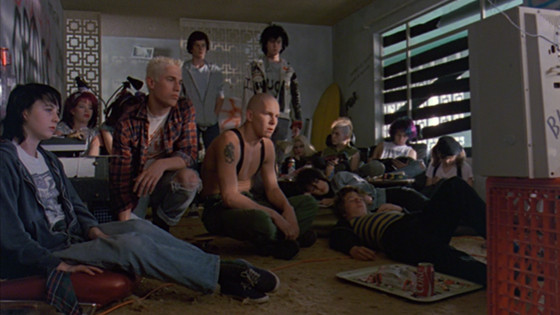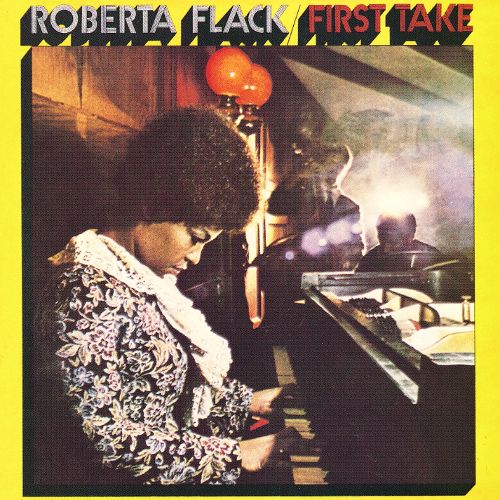Back in the 80’s there was no internet which means no YouTube. Back then a large part of learning about punk rock was swapping homemade cassettes and VHS tapes. Two very important movies in my circle of friends were The Decline of Western Civilization and Suburbia. These movies heavily influenced what bands we listened to, but more importantly they portrayed the tribal culture of punk dress, dance and worldviews. When Izzi suggested that we make a movie list for this issue of Women in Rock, I immediately thought of these two films. Not because they focused on female bands, but because they were made by a female. I decided to write this feature article about Penelope Spheeris as a self proclaimed “Rock and Roll Anthropologist.” She went on to make big budget films such as Wayne’s World, but I want to focus on Suburbia and her Decline of Western Civilization Trilogy.
Spheeris grew up in trailer parks in Orange County. She was voted “Least Likely to Succeed” by her high school classmates. She worked as a waitress at IHOP and Denny’s to put herself through film school. Fellow art school and film students of hers included Stephen Spielberg (you know who he is) and Paul Schrader (who wrote the script for Taxi Driver.) After graduating she started Rock and Reels in 1974. This was the first production company to focus on making music videos. In the late seventies she was working with Albert Brooks making short films for SNL. She was also friends with Rob Reiner who directed Spinal Tap. Brooks and Reiner got her an interview to possibly produce Private Benjamin, the Goldie Hawn comedy about women in the military. She declined the interview to work on her passion project, a documentary on the L.A. rock scene that morphed into her Decline Trilogy.
The Decline of Western Civilization (part one) was her first full length feature. She didn’t have to infiltrate the scene because she was already part of it. Part one was filmed in 1979 and 1980. Spheeris captures the L.A. punk scene at a seminal turning point when punk began to morph into hardcore. The film kicks off with X and features performances by The Germs, Black Flag, Circle Jerks, and Alice Bags.

The film goes deeper than music. She interviews club owners, Slash fanzine and random kids from the scene. Re-watching it, the highlight for me was seeing the editors of Slash doing old school cut and paste layout. She goes behind the scenes to show how the bands lived as well. We see footage of the infamous church where Black Flag lived and practiced, John Doe and Exene hanging out doing home made tattoos and Darby Crash cooking breakfast. Being a true anthropologist, she lets the scene speak for itself. The fans she interviews say racist and homophobic things. By doing so she documents how punk was morphing into a mostly white male dominated scene that was a far cry from the original L.A. scene. She frames the movie to expose this and ends with Fear taunting their audience into a riot. This film is an important historical document for anyone interested in punk subculture.
 Her second film Suburbia was produced by exploitation king Roger Corman who brought us many great B films such as Rock and Roll High School and numerous horror and biker films. In many ways the film is a continuation of her first film. She abandons the documentary format to write and direct a narrative that shows the world in which the audience from Decline existed. She hired kids from the scene to play the kids in the movie and Flea (Fear/Red Hot Chili Peppers) plays my favorite character. He has a pet rat and tries to train the wild dogs that serve as a metaphor throughout the movie. The dogs were left behind when people were evicted just as the kids who squat there were rejected by society. Heavy stuff. Back in 1986 one of my prized possessions was a dubbed VHS of Suburbia and Repo Man. Suburbia is definitely a Rebel Without a Cause for the eighties and simultaneously documented a culture and spread a culture. If you want to know what it felt like to be a punk in the mid 80’s you need to watch this. I just watched it on YouTube and it really took me back to my origins. I even cried a little. I don’t want to spoil the ride by summarizing, but I want to note that the cop/step-father in the movie is a very sympathetic character and that the film deals with a lot of issues. Teens run away from abuse; G.M. shuts down and the community is spiraling; Reaganomics doesn’t trickle down; class anger erupts and a sexually abusive father is confronted. Just go watch it.
Her second film Suburbia was produced by exploitation king Roger Corman who brought us many great B films such as Rock and Roll High School and numerous horror and biker films. In many ways the film is a continuation of her first film. She abandons the documentary format to write and direct a narrative that shows the world in which the audience from Decline existed. She hired kids from the scene to play the kids in the movie and Flea (Fear/Red Hot Chili Peppers) plays my favorite character. He has a pet rat and tries to train the wild dogs that serve as a metaphor throughout the movie. The dogs were left behind when people were evicted just as the kids who squat there were rejected by society. Heavy stuff. Back in 1986 one of my prized possessions was a dubbed VHS of Suburbia and Repo Man. Suburbia is definitely a Rebel Without a Cause for the eighties and simultaneously documented a culture and spread a culture. If you want to know what it felt like to be a punk in the mid 80’s you need to watch this. I just watched it on YouTube and it really took me back to my origins. I even cried a little. I don’t want to spoil the ride by summarizing, but I want to note that the cop/step-father in the movie is a very sympathetic character and that the film deals with a lot of issues. Teens run away from abuse; G.M. shuts down and the community is spiraling; Reaganomics doesn’t trickle down; class anger erupts and a sexually abusive father is confronted. Just go watch it.

The second segment of the Decline Trilogy is subtitled The Metal Years. It focuses on the Sunset Strip glam metal scene and features Faster Pussycat and Poison alongside metal veterans like Alice Cooper, Ozzy, and Kiss. Once again she lets the participants speak for themselves. When I first saw it I didn’t get that. The scene she documents is sexist and shallow. In 1989 I didn’t even realize it’d been made by a woman and thought it was an endorsement and not an expose. Rewatching I find it hilarious. Gene Simmons is interviewed in a lingerie store. Paul Stanley thinks he’s totally cool being interviewed on a bed surrounded by groupies. Third rate bands that sound exactly like Guns and Roses, look exactly like Hanoi Rocks and never went anywhere talk about how original their music is and how they are destined for fame. Highlights include: Ozzy cooking breakfast (think of it as the pilot for The Osbournes); the guy from WASP drinking himself to death while his drunk mother cheers; and Lemmy as the voice of reason.
Part three of the trilogy came out in 1998 and really goes back to the themes she fictionally explored in Suburbia. She focuses on the homeless “gutter punk” scene. I see these kids as the cultural fallout of what she documented in part one and Suburbia. In the opening scene she asks punks if they’ve seen part one.  They all have, but they weren’t even born when it came out. Still it’s surprising how many Black Flag and Fear logos adorn these kids. Keith Morris of the Circle Jerks is interviewed and he brings everything full circle. These kids are the children of hardcore and things are even more right wing and desperate than back in the 80’s. The punk scene is more political and marginalized from the mainstream as well. When this came out I thought it was just exploiting the underbelly of the Anarcho Punk scene that I was a part of. Now I’m almost fifty and I see punk as a self-created ghetto that one must escape to create true change in the world. The bands are merely a backdrop in this one, but Naked Aggression (who my old band opened for in ‘93) talk about how they do benefits for Battered Women Shelters and protest Operation Rescue, a Pro-Life organization that protested at Planned Parenthood. That’s how I remember the nineties–going to Klan Rallies to oppose the Klan and standing outside clinics to ensure women weren’t spit on. I also remember drunk kids who had been homeless since their teens telling me I was Bourgeois for having a job and renting the house that was having the show and they were crashing at. Overall the trilogy ends on a bummer. These kids are hopeless alcoholics who plan on being dead in five years; one of them dies in a fire at a squat; the music has been codified into a boring genre; and nothing seems as fun as it was in the eighties. Still it is an important documentary and it’s touching to hear these kids tell their stories.
They all have, but they weren’t even born when it came out. Still it’s surprising how many Black Flag and Fear logos adorn these kids. Keith Morris of the Circle Jerks is interviewed and he brings everything full circle. These kids are the children of hardcore and things are even more right wing and desperate than back in the 80’s. The punk scene is more political and marginalized from the mainstream as well. When this came out I thought it was just exploiting the underbelly of the Anarcho Punk scene that I was a part of. Now I’m almost fifty and I see punk as a self-created ghetto that one must escape to create true change in the world. The bands are merely a backdrop in this one, but Naked Aggression (who my old band opened for in ‘93) talk about how they do benefits for Battered Women Shelters and protest Operation Rescue, a Pro-Life organization that protested at Planned Parenthood. That’s how I remember the nineties–going to Klan Rallies to oppose the Klan and standing outside clinics to ensure women weren’t spit on. I also remember drunk kids who had been homeless since their teens telling me I was Bourgeois for having a job and renting the house that was having the show and they were crashing at. Overall the trilogy ends on a bummer. These kids are hopeless alcoholics who plan on being dead in five years; one of them dies in a fire at a squat; the music has been codified into a boring genre; and nothing seems as fun as it was in the eighties. Still it is an important documentary and it’s touching to hear these kids tell their stories.
Penelope Spheeris made these films to document things she was inspired by and concerned with. In between making the trilogy she made Hollywood films like Wayne’s World, The Beverly Hillbillies, and The Little Rascals. (You got to have a career.) She started out with a love of rock and roll culture and considers The Decline of Western Civilization and (most likely) Suburbia to be anthropology. She adopted one of the kids from part three and went on to adopt other children. She gave the profits from part three to organizations that help abused children and the homeless. Part three was only shown at festivals because distributors wanted the rights to part one and two. She refused to make a Decline about gangster rap because she felt no connection to the subject. She is also very vocal about sexism in the film industry in the interviews that I watched while researching this article. Hats off to a Women in Rock filmmaker–Party on, Penelope excellent!
She started out with a love of rock and roll culture and considers The Decline of Western Civilization and (most likely) Suburbia to be anthropology. She adopted one of the kids from part three and went on to adopt other children. She gave the profits from part three to organizations that help abused children and the homeless. Part three was only shown at festivals because distributors wanted the rights to part one and two. She refused to make a Decline about gangster rap because she felt no connection to the subject. She is also very vocal about sexism in the film industry in the interviews that I watched while researching this article. Hats off to a Women in Rock filmmaker–Party on, Penelope excellent!





